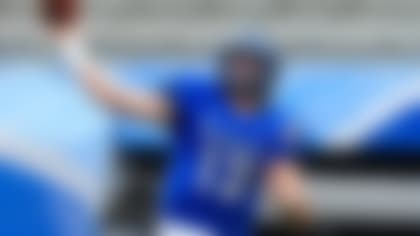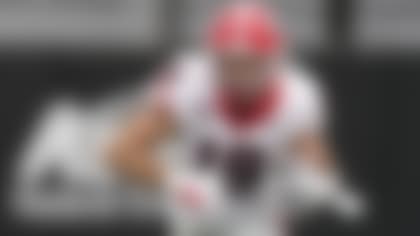Paxton Lynch has been one of the hottest names in college football after guiding Memphis into prominence with his spectacular play this season. The 6-foot-7, 245-pounder has not only teased scouts with his athleticism and arm talent, but he has also piqued the interest of evaluators looking for a franchise player with the "it" factor to reverse the fortunes of a downtrodden squad. With so much buzz and conversation about Lynch possibly applying for early entry into the 2016 draft and commanding a high grade, I thought I would pop in some tape and pay close attention to Wednesday's Birmingham Bowl to see if the performance matched the hype. Lynch, a junior, announced on Thursday that he will apply for early entry into the 2016 draft. After spending a few days doing the research, here are my thoughts on Lynch and his potential.
Athleticism
Lynch is a dynamic quarterback with outstanding athleticism, movement skills and agility. Despite measuring 6-7, 245 pounds, Lynch moves around like a diminutive playmaker on the perimeter. He is a rare find at the position as a big quarterback capable of executing designed quarterback runs, including the speed option, zone-read and QB power. Although we've seen other collegiate quarterbacks execute similar plays, the prospect of using a tall quarterback in this fashion is a testament to Lynch's athleticism and running skills. As a passer, Lynch's athleticism shows up in his ability to maneuver around the pocket. He quickly climbs up in the pocket when the pressure forces him from his sweet spot. In addition, he flashes enough agility and mobility to capably throw on the run. With some teams willing to feature bootlegs prominently in the game plan, Lynch's athleticism is a huge asset to a creative offensive coordinator.
Arm talent
Lynch has very good arm talent. He's not an A-plus thrower, but he capably makes every throw in the book with zip and velocity. Looking at Lynch's game on tape, I thought he tossed a "catchable" ball that made it easy for receivers to pick up chunk yardage after each reception. In a quick-rhythm offense designed to maximize the running skills of athletic playmakers, the soft tosses are essential to picking up "YAC" (yards after catch). From a mechanics standpoint, Lynch has a bit of a long windup, but the ball comes out of his hand quickly with enough RPMs to get into tight windows. Although the extended motion will give NFL defenders an opportunity to get an early jump on his throws, he fires the ball with enough velocity to deliver the ball before most defensive backs can close on receivers.
I thought Lynch excelled in the Tigers' quick-rhythm scheme based on my study of the coaches' tape. He delivers the ball accurately to pass-catchers on screens, quicks (hitches and slants) and timing routes (speed outs). He is very comfortable on "catch-and-fire" throws, and he is a superb playmaker on RPO (run-pass option) passes. He seemingly executed a play fake on 85-90 percent of his passes, which is a significantly higher percentage than most NFL teams feature in their game plans. While some offensive coordinators will appreciate his ability to use a ball fake to hold defenders, the heavy use of RPOs will lead to some questions about Lynch's ability to read defenses based on the simple nature of the concept (quarterback reads the reaction of a designated defender to determine whether to run or throw the ball to a specific receiver). Depending on the flexibility of a team's offensive coordinator, Lynch's reliance on RPOs could affect his final grade in some meeting rooms.
On movement pass plays, Lynch consistently delivers accurate passes within the strike zone on rollouts, sprint passes and bootlegs. He will hit crossers at various levels over the middle, but I was most impressed with his ability to fire the ball to receivers along the boundary. With some teams electing to use movement passes to simplify the reads for the quarterback (half-field reads), Lynch's athleticism and skills as a movement passer could bode well for his development early in his career.
Against Auburn, Lynch raised concerns about his accuracy and ball placement with his erratic performance. He was repeatedly off the mark on short, intermediate and deep throws, which is troubling for a player touted as one of the top quarterbacks in the country. Although it isn't uncommon for a young player to struggle in a bowl game on a big stage, the fact that he didn't start strong against a defense that struggled throughout the season is an issue. Despite completing 11 of his first 17 passes, he only amassed 57 yards and missed a number of "layups" in the opening half. He repeatedly missed high and outside on his short and intermediate throws. He failed to find his rhythm in the second half, finishing the night completing only 16 of 37 passes for 108 yards. Given that the Tigers' offense is built around the quick-rhythm passing game, the misfires will lead scouts to dig into his regular-season tape to see if this is part of a trend.
Pocket Poise
For all of Lynch's strengths as an athletic passer, he must be able to thrive as a pocket passer to succeed as a pro. Looking at Lynch's games from the regular season, I believe he displays good, but not great, poise in the pocket. Although he routinely delivers the ball on time and on target on traditional dropbacks, Lynch will get a little jittery when the pocket collapses and looks to flee the pocket on impromptu scrambles. Despite his success as a scrambler and improvisational playmaker, I have some concerns about some of his "helter-skelter" forays on the perimeter. He will throw the ball up for grabs when forced off his spot, which could result in interceptions at the next level. Despite throwing just 12 interceptions over the past two seasons, Lynch has gotten away with a few errant tosses that should've gone the other way. Given the importance of ball security in the NFL, Lynch's judgment and pocket poise must be on point for him to thrive as a young starter.
Against Auburn, Lynch didn't show great poise or composure for most of the first half. After misfiring on a few layups early in the game, he looked to flee the pocket quickly instead of exhausting the plays (reading the first, second and third option within the progression) before looking to escape the pass rush. Although Lynch was able to generate a few positive plays with his legs, he must exhibit better patience and poise as a pocket passer to become an elite player at the next level.
Football Intelligence
Evaluating a spread quarterback's football IQ is one of the biggest challenges in the pre-draft process. Scouts have a tough time determining how much responsibility falls on the quarterback due to the micromanaging from the sideline. From making the protection calls for the offensive line to executing the proper run-pass checks at the line of scrimmage, scouts prefer quarterback prospects with some experience in those areas as potential franchise players. Looking at Lynch on tape, he appears to have a good command of the Tigers' offense during the pre-snap phase. He communicates and relays signals to his perimeter players; he also walks up to the line and echoes the play calls to his offensive line. Although those tactics aren't necessary viewed as important on the outside, Lynch must command a huddle and communicate with his teammates -- it's critical to his success as a pro.
Lynch plays in a spread offense that features a host of screens, quicks and RPOs. Thus, he isn't really tasked with complex reads from the pocket. Lynch thrives on "catch-and-fire" throws and it remains to be seen if he can transition to an offense that features pure progression reads. Against Auburn, he had a tough time stringing together completions on plays that didn't involve some form of deception and trickery in the backfield. The overwhelming majority of his throws consisted of screens, quicks and RPOs. Although those easy concepts have fueled Lynch's high completion percentage, the NFL playbook will require him to make "big boy" throws on the perimeter. Based on his struggles executing the Tigers' offense against an SEC defense, scouts will certainly question his ability to handle a complex playbook as a pro. Given those concerns, scouts might pause before putting a high grade on Lynch's potential.
Clutch Factor
Blue-chip prospects are judged on their ability to play their best against elite competition and in critical moments. Quarterbacks, in particular, are expected to take it up a level when facing a premier opponent on a big stage. Despite Lynch's remarkable physical tools and his ridiculous production, scouts harbored concerns about the level of competition he faced throughout the regular season. Thus, it was important for him to shine in the Birmingham Bowl against an SEC opponent. Although the Auburn Tigers were regarded as a mid-level team in the SEC, the NFL-caliber defenders dotting their roster would provide Lynch with a glimpse of the speed, athleticism and quickness that he would face on most Sundays as a pro.
After Lynch's disappointing performance against Auburn, I have serious concerns about his game. He was so erratic with his judgment, ball placement and playmaking ability that I wonder about his ability to grow into a franchise quarterback for a dismal squad searching for an answer at the position. Sure, he possesses all of the physical traits that scouts covet in a blue-chip quarterback, but "elite" guys find a way to shine on the biggest and brightest stage. While every quarterback suffers through a disappointing game, great players display enough grit and determination to show scouts that they are capable of handling adversity. Lynch appeared frustrated throughout the game. He never was able to string together enough positive plays to create momentum for his teammates.
Although he has a lot of film that suggests he's ready for the pro game, Lynch will have a tough time erasing this poor performance from the minds of evaluators searching for a franchise player at the position.
Conclusion
There's no question that Lynch is one of the most talented quarterbacks in college football. He exhibits rare athleticism and movement skills for a "big" quarterback. He has enough arm talent to make every throw in the book. However, I had some questions about his readiness and potential based on my extensive tape study (Ole Miss, Houston, Temple, South Florida, and Cincinnati) prior to the Birmingham Bowl. Those concerns are heightened after watching him struggle against Auburn. While I still believe he's an intriguing prospect with potential, I see him as a developmental prospect who will need time to grow into the position. If I had to compare him to a current pro, I would cite Ryan Tannehill as an apt comparison. Lynch can function at a high level in executing concepts that are similar to the tactics he runs at Memphis, but he will need time to transition to a pro playbook.
Follow Bucky Brooks on Twitter @BuckyBrooks.













